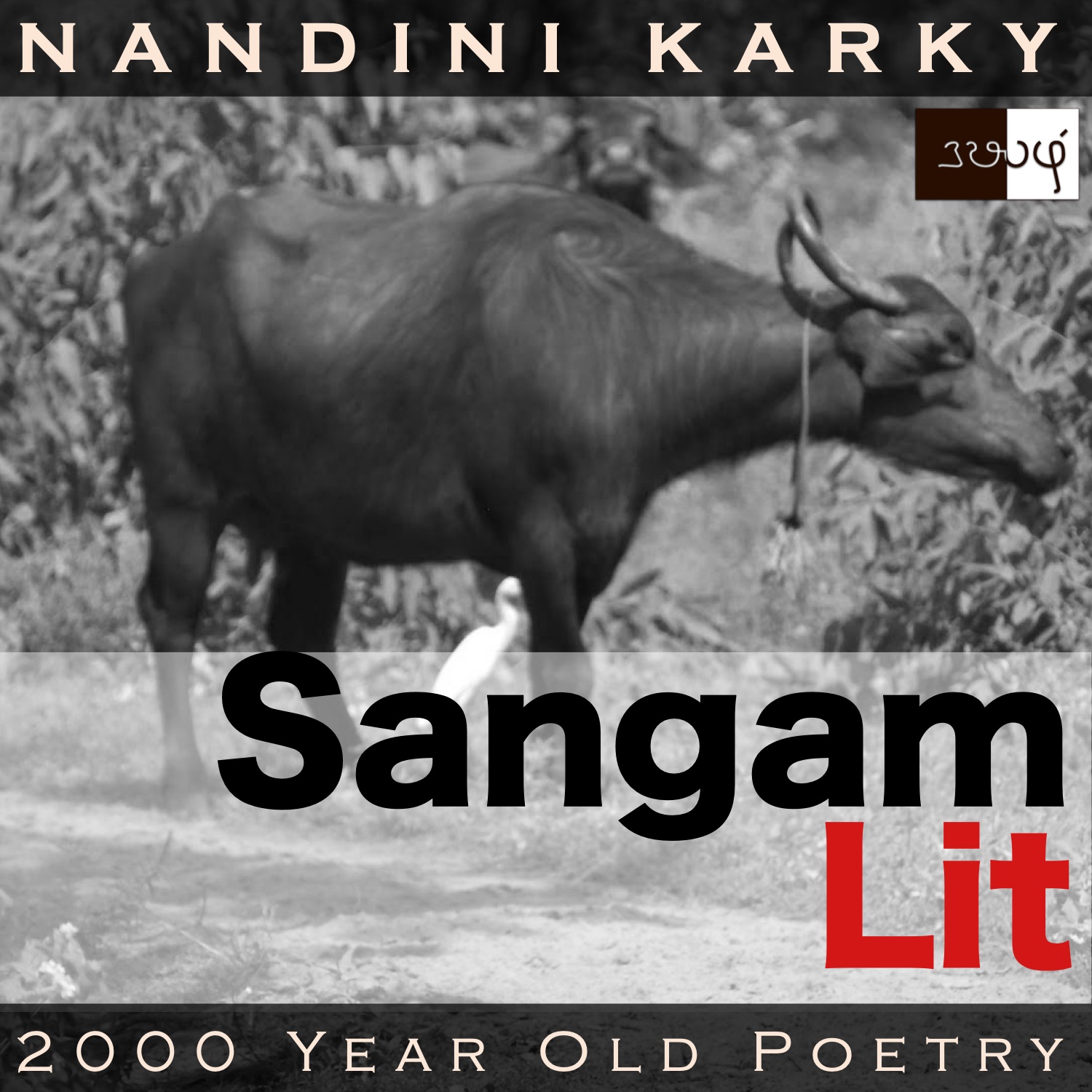Podcast: Play in new window | Download
Subscribe: Apple Podcasts | Spotify | Amazon Music | Android | iHeartRadio | TuneIn | RSS | More

In this episode, we relish how an element of the land is etched in words, as portrayed in Sangam Literary work, Kurunthogai 279, penned by Madurai Maruthan Ilanaakanaar. The verse is situated in the forests of ‘Mullai’ and speaks in the voice of the lady to the confidante, in response to the confidante’s words asking the lady to bear with the man’s parting.
திரிமருப்பு எருமை இருள் நிற மை ஆன்
வருமிடறு யாத்த பகுவாய்த் தெண் மணி,
புலம்பு கொள் யாமத்து, இயங்குதொறு இசைக்கும்
இது பொழுது ஆகவும் வாரார்கொல்லோ-
மழை கழூஉ மறந்த மா இருந் துறுகல்
துகள் சூழ் யானையின் பொலியத் தோன்றும்
இரும் பல் குன்றம் போகி,
திருந்து இறைப் பணைத் தோள் உள்ளாதோரே?
‘How can I bear at such a time’ sighs a voice in this verse! The opening words ‘திரிமருப்பு எருமை’ meaning ‘a buffalo with curving horns’ stresses on the occupation of cattle-rearing in villages around these ancient forest regions. In ‘வருமிடறு யாத்த பகுவாய்த் தெண் மணி’ meaning ‘clear bells with wide mouths on the lined neck’, we see an object signifying ownership of an animal by a human, like contemporary collars on dogs. The phrase ‘புலம்பு கொள் யாமத்து’ meaning ‘in the midnight hour filled with loneliness’, the searing nature of the lady’s solitary situation comes to fore. Right before our eyes soars a ‘huge black rock, which seems to be forgotten by the rain’ in ‘மழை கழூஉ மறந்த மா இருந் துறுகல்’. Ending with the words ‘பணைத் தோள் உள்ளாதோரே’ meaning ‘he who thinks not of bamboo-like arms’, the verse welcomes us to know more.
Buffaloes at the midnight hour seem to be wreaking havoc on the lady’s mind. The context reveals that the man and lady were leading a married life when the man parted away to gather wealth. The lady languished in his absence and the confidante advises her to bear better with the man’s parting. To the confidante, the lady says, “As the buffalo in the hue of darkness, with twisted horns, moves, the wide-mouthed crystal bells on its lined neck resounds in the midnight hour. Isn’t this the time he should be back? But he returns not. Crossing many dark hills dotted with black rocks that have been forgotten to be washed by the rains, appearing like dust-coated elephants, he who walks thinks not of my well-structured bamboo-like arms!” With these words, the lady expresses her inability to bear with the man’s parting under the given circumstances.
Time to explore the nuances. The lady talks about a black buffalo that’s moving about in the midnight hour. How does the lady know this, from inside her home? From the crystal clear sound of the bells on the buffalo’s neck resounding through the night. This is the time when the man should have returned but he’s not back yet, the lady says. The reason she hears it is that she’s sleepless without the company of her man. A scene whose sight and sound sketches the lady’s loneliness in vivid detail. Speaking of vivid detail, the lady then mentions a huge, dark boulder which the rains have forgotten to wash and she places this in parallel to a dust-coated elephant. This visual she imprints in our mind to say that the man had left to traverse many hills, filled with such boulders. She finally concludes by saying that he seems not to think of her bamboo-like arms, for if he had, he would be back, wouldn’t he?
Let’s turn our attention to that image of a boulder said to be unwashed by the rains! There’s much significance there, because it talks of a land that the rains have forsaken. A dry, arid region that the man must cross to fulfil his mission. Instead of just presenting the boulder as a rain-forgotten rock, the poet intensifies it further in our minds by comparing it with an elephant covered in mud. Elephants are known to love taking mud baths. They roll in the mud and spray dirt on their back so as to keep their sensitive skin protected from the harshness of the heat. The rounded dusty boulder thus becomes unforgettable with this added simile of a dirt-coated elephant. And thus, many a Sangam poem may talk about the same emotions of parting and pining but yet, these leave us with different thoughts and different images every time and that’s the rejuvenating power of this ancient poetry!




Share your thoughts...